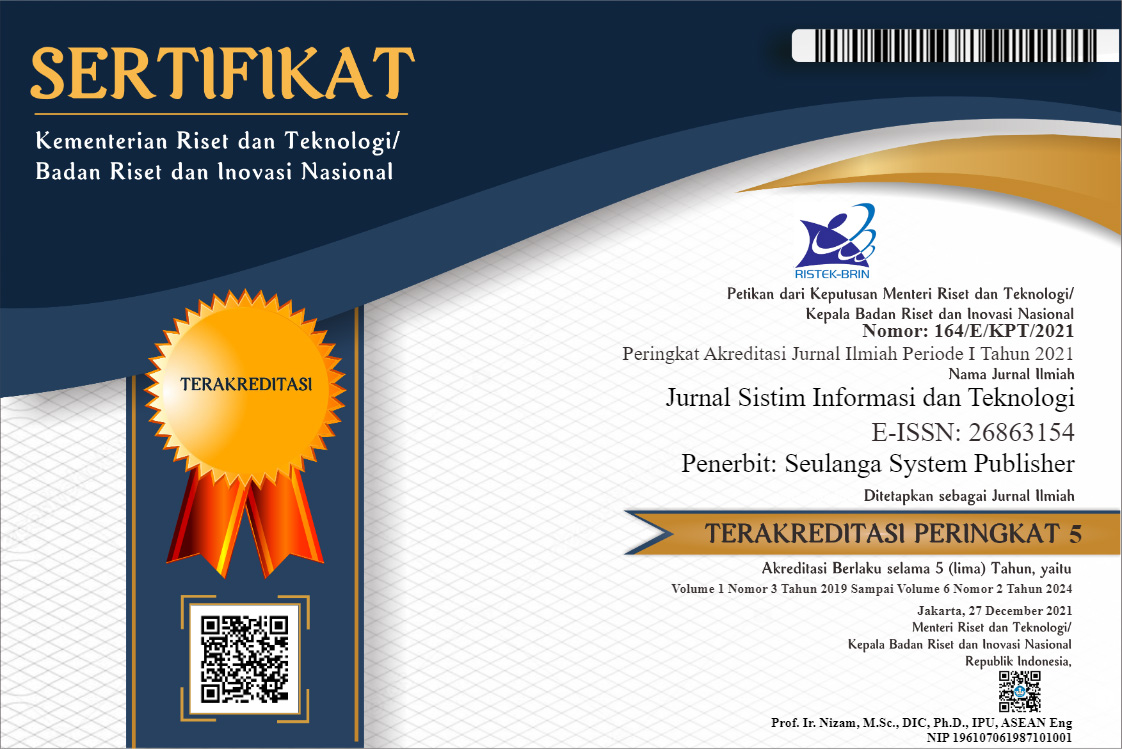Prediksi Tingkat Kepuasan dalam Pembelajaran Daring Menggunakan Algoritma Naïve Bayes
DOI:
https://doi.org/10.37034/jsisfotek.v3i3.49Keywords:
Online Learning, Naïve Bayes, Prediction, Satisfaction Level, Covid 19Abstract
The growth of learning at this time is influenced by advances in data and communication technology. One of the data technologies that functioned in the world of learning during the COVID-19 pandemic was online education. Online education is used as a liaison between lecturers and students in an internet network that can be accessed at any time. The online media used are Whatsapp, Google Classroom, Google Meet, Cloud x and the Zoom application. This research aims to predict the level of student satisfaction in online education as well as to distribute donations to large academies in making policies related to improving the quality of education online. The information used was obtained by distributing questionnaires to 110 students of the 2020/2021 class. The parameters in the questionnaire are lecturer communication, online education atmosphere, student evaluation, module delivery. Naïve Bayes is a prediction method for finding simple probabilities based on the Bayes theorem with a strong assumption of independence. Rapid Miner is one of the tools used for testing information and viewing the results of accuracy based on revolutionary information. The results of the test using 80 training information and 30 testing information show very good accuracy.
References
Gustientiedina., Siddik, M., & Desnelita, Y. (2019). Penerapan Naïve Bayes Untuk Memprediksi Tingkat Kepuasan Mahasiswa Terhadap Pelayanan Akademis. Jurnal Infomedia, 4(2).
Carolina, I., Supriyatna, A., & Puspitasari, D. (2020). Analisa Tingkat Kepuasan Mahasiswa Terhadap Perkuliahan Daring Pada Era Pandemi COVID-19. Prosiding Seminar Nasional Riset dan Information Science, 2, 342-347.
Simanjuntak, S. F. I., & Elisa, E. (2020). Analisa Data Mining Menggunakan Metode Bayes Untuk Mengukur Tingkat Kerusakan Mesin. IJTVET: International Journal of Technology Vocational Education and Training, 1(1), 49-54.
Tyas, R. A., Anggraini, M ., Sulasiyah, I. A., & Aini, Q. (2020).Implementasi Algoritma Naïve Bayes dalam Penentuan Rating Buku. SISTEMASI: Jurnal Sistem Informasi, 9(3). DOI: https://doi.org/10.32520/stmsi.v9i3.915 .
Apandi, T. H., & Sugianto, C. A. (2019). Algoritma Naïve Bayes untuk Prediksi Kepuasan Pelayanan Perekaman E-KTP. JUITA: Jurnal Informatika, 7(2), 125-128. DOI: https://doi.org/10.30595/juita.v7i2.3608 .
Samuel, Y. T., & Dewi, K. (2019). Penggunaan Metode Naïve Bayes dalam Mengukur Tingkat Kepuasan Pengguna Terhadap Online System Universitas Advent Indonesia. Jurnal TeIKA, 9(2). DOI: https://doi.org/10.36342/teika.v9i02.2162 .
Siregar, V. M. M. (2018). Sistem Pendukung Keputusan Penentuan Insentif Bulanan Pegawai dengan Menggunakan Metode Naïve Bayes. Jurnal SISTEMASI, 7(2), 87-94.
Gerhana, Y. A., Fallah, I., Zulfikar, W. B., Maylawati, D. S., & Ramdhani, M. A. (2019). Comparison of Naïve Bayes classifier and C4.5 Algorithms In Predicting Student Study Period. Journal of Physics: Conference Series, 1280(2), 7-19. DOI: https://doi.org/10.1088/1742-6596/1280/2/022022 .
Mariati, E., Lestari, A., & Widiarty. (2020). Model Klasifikasi Kepuasan Mahasiswa Teknik Terhadap Sarana Pembelajaran Menggunakan Data Mining. JTI : Jurnal Teknologi Informasi, 14(2). DOI: https://doi.org/10.47111/jti.v14i2.1222 .
Yasid, M., & Janedi, L. (2019). Analisis Sentimen Maskapai Citilink Pada Twitter dengan Metode Naïve Bayes. JIF:Jurnal Ilmiah Informatika, 7(2), 49-54 DOI: https://doi.org/10.33884/jif.v7i02.1329 .
Fitriani, A. S. (2019). Penerapan Data Mining Menggunakan Metode Klasifikasi Naïve Bayes untuk Memprediksi Partisipasi Pemilihan Gubernur. JTAM (Jurnal Teori dan Aplikasi Matematika), 3(2), 98-104.
Normah, N. (2019). Naïve Bayes Algorithm For Sentiment Analysis Windows Phone Store Application Reviews. Journal Publications & Informatics Engineering, 3(2). DOI: https://doi.org/10.33395/sinkron.v3i2.242 .
Yang, L., Fu, B., Li, Y., Liu, Y., Huang, W., Feng, S., Xiao, L., Sun, L., Deng, L., Zheng, X., Ye, F., & Bu, H. (2020). Prediction Model of The Response To Neoadjuvant Chemotherapy in Breast Cancers By a Naïve Bayes Algorithm. Computer Methods and Programs In Biomedicine, 192. DOI: https://doi.org/10.1016/j.cmpb.2020.105458 .
Lee, S., Lee, M. J., Jung, H. S., & Lee, S. (2019). Landslide Susceptibility Mapping using Naïve Bayes and Bayesian Network Models in Umyeonsan, Korea.Geocarto International, 35(15). DOI: https://doi.org/10.1080/10106049.2019.1585482 .
Sanchez-Franco, M. J., Navarro-Garcia, A., & Rondan-Cataluna, F. J. (2018). A Naïve Bayes Strategy for Classifying Customer Satisfaction: A Study Based On Online Reviews of Hospitality Services. Journal of Business Research, 101, 499-506. DOI: https://doi.org/10.1016/j.jbusres.2018.12.051 .
Gayathri, B. M., & Sumathi, C. P. (2016). An Automated Technique using Gaussian Naïve Bayes Classifier to Classify Breast Cancer. International Journal of Computer Applications, 148(6). DOI: http://doi.org/10.5120/ijca2016911146 .
Liantoni, F., & Nugroho, H. (2015), Klasifikasi Daun Herbal Menggunakan Metode Naïve Bayes Classifier dan K- Nearest Neighbor. Jurnal SimanteC, 5(1).









